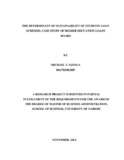| dc.description.abstract | The financing of Student loans schemes has been a major challenge to governments all
over the world including Kenya where loans are administered through Higher Education
Loans Board (HELB – hereafter referred to as the Board).This has resulted from reduced
government funding, increased student population, overdependence on financing by
students from the schemes, slow economic growth, increased education costs, the hidden
subsidies in most schemes and the death of recipients especially resulting from
HIV/AIDS pandemic. This has led to the board’s realization of challenges that must be
put into account during its operations. These challenges include the need to achieve selfsustainability
through mobilization of funds, increased recoveries through reduced default
rate and entering into strategic partnerships that can assist in netting of defaulters. Over
time, the board has made major achievements as it has embarked on an aggressive
campaign and public education aimed at recovering the outstanding loans which has led
to increased recoveries to over 55%. This has led to an increase in the number of students
accessing the loans from both the public and private universities. The above
notwithstanding, there is need for the board to identify new sources of funds to counter
the ever rising demand for student loans. Lessons learnt from loan schemes in other
countries can be used to enhance both the operational and financial sustainability of the
board. The strategies so adopted by the said successful schemes can be replicated at
HELB. The Project is therefore a Descriptive research on the operational and financial
sustainability of the Higher Education Loans Board. The study’s main objective is to
establish the operational and financial sustainability of the Higher Education Loans
Board (HELB). A review of related literature was conducted, which comprises,
background of student loan financing, loan default, success and failure of student loans
schemes and other literature relating to issues on student loan financing. The researcher
used secondary data. Secondary data was obtained from relevant literature from various
sources including financial statements and reports at HELB. Conclusions, implications,
limitations and recommendations were completed and statements were made on the
findings. | en_US |

